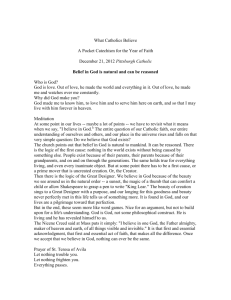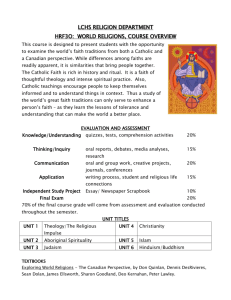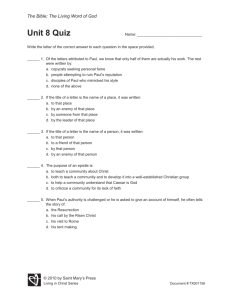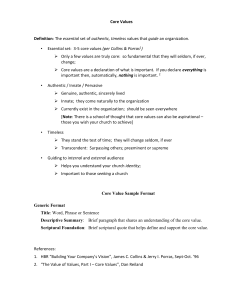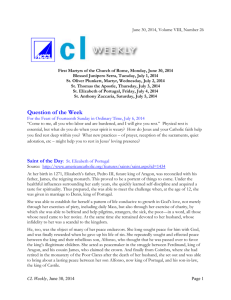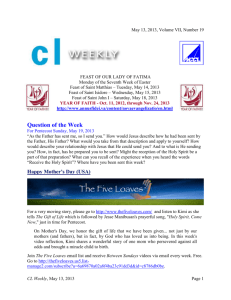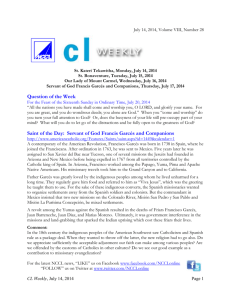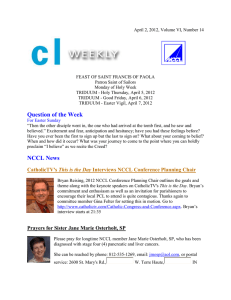June 17 (Word Document), 2013
advertisement
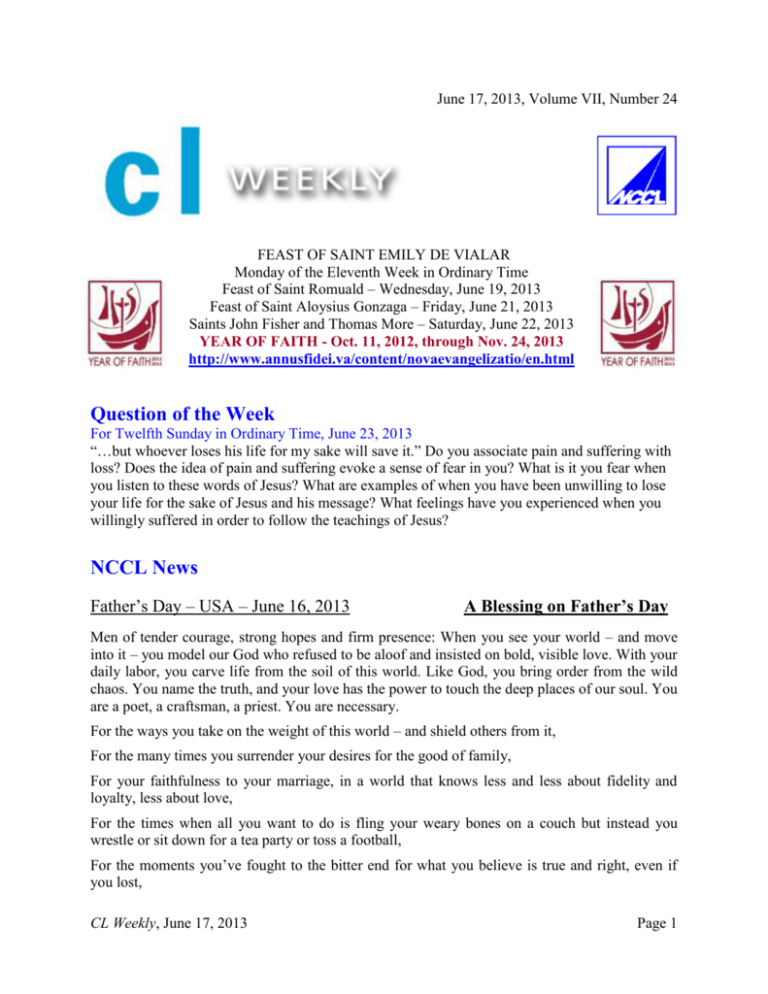
June 17, 2013, Volume VII, Number 24 FEAST OF SAINT EMILY DE VIALAR Monday of the Eleventh Week in Ordinary Time Feast of Saint Romuald – Wednesday, June 19, 2013 Feast of Saint Aloysius Gonzaga – Friday, June 21, 2013 Saints John Fisher and Thomas More – Saturday, June 22, 2013 YEAR OF FAITH - Oct. 11, 2012, through Nov. 24, 2013 http://www.annusfidei.va/content/novaevangelizatio/en.html Question of the Week For Twelfth Sunday in Ordinary Time, June 23, 2013 “…but whoever loses his life for my sake will save it.” Do you associate pain and suffering with loss? Does the idea of pain and suffering evoke a sense of fear in you? What is it you fear when you listen to these words of Jesus? What are examples of when you have been unwilling to lose your life for the sake of Jesus and his message? What feelings have you experienced when you willingly suffered in order to follow the teachings of Jesus? NCCL News Father’s Day – USA – June 16, 2013 A Blessing on Father’s Day Men of tender courage, strong hopes and firm presence: When you see your world – and move into it – you model our God who refused to be aloof and insisted on bold, visible love. With your daily labor, you carve life from the soil of this world. Like God, you bring order from the wild chaos. You name the truth, and your love has the power to touch the deep places of our soul. You are a poet, a craftsman, a priest. You are necessary. For the ways you take on the weight of this world – and shield others from it, For the many times you surrender your desires for the good of family, For your faithfulness to your marriage, in a world that knows less and less about fidelity and loyalty, less about love, For the times when all you want to do is fling your weary bones on a couch but instead you wrestle or sit down for a tea party or toss a football, For the moments you’ve fought to the bitter end for what you believe is true and right, even if you lost, CL Weekly, June 17, 2013 Page 1 For those of you who bear the scars from your own father, For those of you who have become father for another, For sticking around, For keeping your word, For laughing – and for being able to laugh at yourself, For teaching us how to tell the truth, how to say “I’m sorry” and how to cry, We bless you. May the God who filled Father Adam with life and who filled King David with wisdom, boldness and tenderness and who brought our Redeemer into the world to enact and demonstrate selfless love, fill you with all grace and joy today. In the name of the Father and of the Son and of the Holy Spirit. Amen. -Winn Collier http://winncollier.com/a-blessing-on-fathers-day/ 2013 Peter’s Pence Collection: Be Pilgrims of Charity The Peter's Pence Collection gives each of us the opportunity to be a pilgrim of charity around the world. Our gifts to this annual Collection help the Holy Father strengthen dioceses, religious orders, and struggling communities of faith. More information about Peter’s Pence can be found at http://www.usccb.org/catholic-giving/opportunities-for-giving/peterspence/collection/index.cfm. There are many places around the globe where the Church struggles to be a visible sign of charity, but thankfully, the Holy Father is the pilgrim of charity for Catholics everywhere. In regions where Catholics are persecuted for their faith and in nations overloaded with refugees and victims of war and natural disasters, the works done by the Holy Father help the Church extend charity to those most in need. Congratulations Frank Zolvinski – Ordained to the Permanent Diaconate Frank Zolvinski, NCCL Representative Council member and Director of Religious Education for the Diocese of Gary, Indiana was ordained to the Permanent Diaconate on June 1, 2013. The deacon's ministry is "to bring God's Word to believer and unbeliever alike, to preside over public prayer, to baptise, to assist at marriages and bless them. To give viaticum to the dying, and to lead the rites of burial. Once he is consecrated by the laying on of hands, he will perform works of charity in the name of the Bishop". The deacon is "to celebrate faithfully the liturgy of hours for the Church and for the whole world." (Rite of Ordination of a Deacon). CL Weekly, June 17, 2013 Page 2 NCCL extends its prayers and blessings to Frank on this momentous occasion. Notes of congratulations can be sent to Frank at the Diocese, 9292 Broadway, Merrillville IN 46410-7088 , or electronically to fzolvins@dcgary.org. Catechetical Sunday – September 15, 2013 This year, the Church will celebrate Catechetical Sunday on September 15, 2013, and will focus on the theme Open the Door of Faith. Those whom the community has designated to serve as catechists will be called forth to be commissioned for their ministry. Catechetical Sunday is a wonderful opportunity to reflect on the role that each person plays, by virtue of Baptism, in handing on the faith and being a witness to the Gospel. Catechetical Sunday is an opportunity for all to rededicate themselves to this mission as a community of faith. As in past years, NCCL will sell printed copies of prayer cards, family commitment cards, posters, and certificates in English and Spanish. Check the NCCL website www.NCCL.org for ddmore information on ordering your Catechetical Sunday materials. This year’s reflection journal was edited by Michele Harris and the reflections were written by nine different NCCL members. The reflection book is entitled WELCOME! Open the Door – Pass through the gate – Seek the Christ. Sample pages from each of the writers are available on the NCCL Homepage (www.NCCL.org). The 2013 NCCL pin represents the theme for Catechetical Sunday "Open the Door of Faith" with a beautiful 3 dimensional effect. The all metal pin is outlined in the same gold as the cross. The Alpha and Omega from the Catechetical Sunday logo are imprinted on the shiny copper doors that open to our Redeemer, Jesus Christ hanging on a gold cross in a brushed copper room. The doors break through the gold outline to enhance the theme, Open the Door of Faith. The Spirit of God in each of us is the agent of the new evangelization and inspires each of us to open our heats and to go forth as catechist and teacher. Help your organization and order your materials from NCCL. Actual pin size is 7/8 inch. CL Weekly features several pieces each week from June 3–September 16. This week we feature a: Catechist In-Service by Curtis A. Martin, President, Fellowship of Catholic University Students. The In-Service is entitled Encountering Christ Through an Authentic Witness of Faith and an Ever-Greater Understanding of Its Contents and can also be downloaded at http://tiny.cc/cn7uxw. CL Weekly, June 17, 2013 Page 3 Parish Resource by Jonathan Sullivan, Director of Catechetical Services, Diocese of Springfield, Illinois. This piece, Promoting Catholic Principles and the Significance of Vatican II Through the New Mass Media, would make an excellent bulletin insert and can be downloaded from http://tiny.cc/aw7uxw. You can download the complete list of FREE Resources which can also be found at http://tiny.cc/263uxw. Be sure to order your Catechetical Sunday materials from NCCL (www.NCCL.org). FCH Animators Choose Leadership Positions FCH2: (from left to right) Rita Martinez, Loyola Press, Vice President Libia E. Páez-Howard, Archdiocese of Chicago, former President of FCH FCH1: (from left to right) Victor Valenzuela, William H. Sadlier, Inc., Finance Officer Maria Covarrubias, Diocese of San Bernadino, President Peter Ductram, Archdiocese of Miami, Fund Development Officer Luis Ramirez, Christ Our Savior Parish, Diocese of Orange, Membership Officer Miriam Hidalgo, Archdiocese of Hartford, Communications Officer Julie Blevens, Archdiocese of Galveston-Houston, Secretary Jose Amaya, Archdiocese of Military Services, USA, Membership Officer Echo the Promise – Challenge $2650! – Within the Next 14 Days! After an appeal at the Awards Luncheon by Treasurer Joanie McKeown, those present contributed $2650 to the Echo the Promise campaign. This campaign is solely for the professional development of NCCL members. Half of what is collected goes into a restricted endowment account and once it reaches $100,000, proceeds from the money can distributed. In the meantime, the other half of the money is available for use by the Constituency Forums. CL Weekly, June 17, 2013 Page 4 Your challenge is to meet or beat the $2650 that was raised at the annual conference Echo the Promise kick-off and to do it by July 1, 2013. That gives us about fifteen days. To make it easier, you can donate online by going to the homepage of our website (www.NCCL.org) and click on the Echo the Promise logo. We have raised $515 which leaves us $2135 to raise before the month of July. Here are the latest people to join our Echo the Promise Donors. We would like to count you as one of our benefactors – how about $5.00? Why not donate online right now! Connie Calmer-Anderson Sr. Caroline Cerveny Janet Schaeffler Cris Villapando People of God: Pope Francis’ Continuing Catechesis on the Creed Today I would like to briefly highlight another term with which the Second Vatican Council has defined the Church, as "the People of God " (cf. Dogm. Const. Lumen Gentium, 9; Catechism of the Catholic Church, 782). And I do so with some questions, on which everyone can reflect. 1. What does it mean to be "People of God"? Firstly it means that God does not belong specifically to any people; because it is He who calls us, summons us, invites us to be part of his people, and this call is addressed to us all, without distinction, because God's mercy «wants salvation for everyone» (1Tm 2:4). Jesus does not say to the Apostles and to us to form an exclusive group, an elite. Jesus says: go and make disciples of all Nations (cf. Mt 28:19). Saint Paul states that in the people of God, in the Church, "there is no longer Jew nor Greek ... since you are all one in Christ Jesus" (Gal 3:28). I would also say to those who feel far away from God and the Church, the one who is fearful or indifferent, who thinks he can no longer change: the Lord calls you to join his people and does so with great respect and love! 2. How does one become a member of this people? It is not through physical birth, but through a new birth. In the Gospel, Jesus says to Nicodemus that one must be born from above, out of the water and the spirit to enter into the Kingdom of God (cf. Jn 3:3-5). It is through Baptism that we are introduced to this people, through faith in Christ, a gift from God that must be nurtured and grown throughout our life. Let us ask ourselves: How can I grow the faith that I received in my Baptism? 3. What is the law of God's People? It is the law of love, love for God and love for your neighbor according to the new commandment which the Lord has left us (cf. Jn 13:34). A love, however, that is not sterile sentimentalism or something vague, but that which recognizes God as the only Lord of life and, at the same time, receives one’s neighbor as a true brother, overcoming divisions, rivalries, misunderstandings, selfishness; both things go together. How much we still have to do in order to live this new law concretely, that of the Holy Spirit who acts in us, that of charity, of love! When we look in the newspapers or on television, there are so many wars between Christians: but how can this happen? In the people of God, how many wars! In the neighborhoods, in the workplace, how many wars out of envy, jealousy! Even in the family CL Weekly, June 17, 2013 Page 5 itself, how many internal wars! We must ask the Lord to make us understand this law of love. How beautiful it is to love each other as true brothers. How beautiful! Let's do one thing today. Maybe we all have people we like and others we dislike; maybe many of us are a little angry with someone; then, say to the Lord: Lord, I am upset with this person or that. I will pray for him and for her. Praying for those with whom we are angry is a good step in this law of love. Do we do it? Let's do it today! 4. What is the mission of the People of God? To bring into the world the hope and salvation of God: to be a sign of God's love which calls everyone to have a friendship with him; to be the yeast that leavens the dough, salt that gives flavor and protects from corruption, light that illuminates. All around us, just by opening a newspaper – as I said- we can see that the presence of evil is there, the Devil acts. But I would like to say out loud: God is stronger! And I would like to add that the sometimes dark reality, marked by evil, can change, if we first bring the light of the Gospel, above all with our lives. If in a stadium, think of here in Rome at the Olympic Stadium, on a dark night, one person turns on a light, you can just barely see it, but if more than 70,000 spectators each turns on his own light, the stadium lights up. Let's make our life a light of Christ; together we will bring the light of the Gospel into the entire reality. 5. What is the end of this people? Their end is the Kingdom of God, begun here on Earth by God himself, and that must be extended until its completion, when Christ will appear (cf. Lumen Gentium, 9). The aim then is full communion with the Lord, to enter into his own divine life, where we will live the joy of his love without measure. Dear brothers and sisters, to be Church, to be God's People, according to the great design of the Father's love, it's like being the leaven of God in our humanity, it means announcing and bringing the salvation of God into this world of ours, which is often lost, in need of answers that encourage, that give hope, that provide new vigor in the journey. May the Church be both a place of God's mercy and hope, where everyone can feel welcome, loved, forgiven and encouraged to live according to the good life of the Gospel. And to make the other feel welcome, loved, forgiven, encouraged, the –Church must have its doors open so that everyone can enter. And we must go out through those doors to announce the Gospel. NCCL and the Catechesis in Preaching Research Initiative – NCCL Exclusive How’s the preaching in your parish? What difference does the Sunday homily make in the discipleship of your people? The bishops’ new document on preaching, Preaching the Mystery of Faith: the Sunday Homily, recommends a turn toward catechetical preaching. At this juncture, we are looking for you, as catechetical leaders, to lend your voice to the direction that homiletics will take. At the NCCL conference in Cleveland, many folks offered their insights and experience through four focus groups and a preliminary paper survey. NOW: The final survey, adapted and furthered by the input from the conference, is now available online to all of the NCCL membership. Please CL Weekly, June 17, 2013 Page 6 participate fully so that the voice of catechetical leaders is heard, by following this link: https://www.surveymonkey.com/s/the-NCCL-Catechesis-in-Preaching-Research-Initiative The survey will be open for only two weeks, so please respond as soon as you can. Please do not share the weblink with those outside of the catechetical community. This is an NCCL exclusive survey. N.B. If you participated in the preliminary paper survey at the conference, please also now contribute online – some of the questions have been strengthened and altered as a result of your input. Thanks! We would also like for your data to be included with the overall responses. Thank you for willingness to give your voice to this valuable project! Interfaith Marriages: Religious Tolerance or Religious Dilution? Martin Marty, the Fairfax M. Cone Distinguished Service Professor Emeritus of the History of Modern Christianity at the Divinity School at The University of Chicago, opens up the dialogue about interfaith marriages. Most persons with whom I have discussed this issue, and in particular couples who are a part of Engaged Encounter, indicate that couples preparing for an interfaith marriage see the world with rose-colored glasses and it isn’t until they have their first child that a serious conversation is held, until then, they feel it will all work out easily. We all need to listen more to those who are living this experience in a faithfilled way. In his guest column for On Being, Martin Marty affirms the need to listen to those in interfaith marriages. One little e-column cannot begin to canvass such a broad field of inquiry and issues as this; my file of print-outs on the subject bulges, and, in effect, whispers: “Mention me, even if you can’t do me justice.” So here is a mention, and a hope that people rejecting, entering, living with, suffering because of, and setting examples in interfaith marriages will keep telling their stories and the rest of us will keep reading about them, learning from them…. If you are interested in reading more, please go to http://www.onbeing.org/blog/interfaithmarriages-religious-tolerance-or-religious-dilution/5641. Strong Catholic Families, Strong Catholic Youth The Strong Catholic Families: Strong Catholic Youth in-services and resources are designed to (a) motivate parents to take responsibility for the faith development of their children, and (b) motivate parishes/schools to support and equip parents and families in passing the faith to their children www.strongcatholicfamilies.org: The Strong Catholic Families: Strong Catholic Youth three-part training process is hosted by dioceses for the purpose of changing the way CL Weekly, June 17, 2013 Page 7 parishes/schools partner with parents. Developed by NFCYM and presented in partnership with the National Conference for Catechetical Leadership (NCCL), the National Association of Catholic Family Life Ministers (NACFLM) and the National Catholic Educational Association (NCEA), you can view this four (4) minute video at http://www.youtube.com/watch?v=PrL7ETNyx4w. If you have not already experienced this initiative, it is worth your time to consider the investment. Catholics, Orthodox Team Up to Promote Internet Safety The Communications Department of the U.S. Conference of Catholic Bishops (USCCB) and the Greek Orthodox Archdiocese of America (GOA) have launched www.faithandsafety.org, a resource for adults to help children safely navigate online. The website and complementary social media channels (http://twitter.com/faithandsafety and http://facebook.com/faithandsafety) address safe use of the Internet, mobile devices and other technology, emphasizing the positive use of technology to support children's faith. June is Internet Safety Month. "Our children look to their parents for wisdom and guidance. However, many parents feel somewhat ill-equipped to help their children traverse the unfamiliar terrain of the digital social world," said Archbishop Demetrios of the Greek Orthodox Church in America. "This joint initiative between our two Churches is a positive step in helping parents equip their children in the digital world. We have a responsibility to the Lord Himself Who said, 'Let the children come unto Me' (Matt 19.14)." "Faithandsafety.org is intended to be not only a set of practical tools and guides for adults, but also a place where they can find a faith framework for conversations with their children about the need to be ethically and morally equipped when they go online," said Bishop John C. Wester of Salt Lake City, chairman of the USCCB Committee on Communication. "We believe that this site, presented from the perspective of the Greek Orthodox and Catholic Church, provides a unique perspective on being missionaries of faith on the Digital Continent." Content on the site includes mobile app reviews, how to address issues faced by children online, such as bullying, and resources to educate parents on protecting their home networks. Content will be expanded over the next several months and feature regular columns by leading Catholic and Orthodox figures on connecting faith and technology, as well as news updates, how-to guides and video content. Faithandsafety.org will feature content by Common Sense Media (http://www.commonsensemedia.org/), an independent nonprofit organization dedicated to helping kids and families thrive in a world of media and technology. CL Weekly, June 17, 2013 Page 8 Ready for the next digital quantum leap? Michael Kelly SJ is executive director of ucanews.com, Asia’s Most Trusted Independent Catholic News Source. He begins his article by stating that “according to the head of Google, Eric Schmidt, seven billion of us, up from two billion right now, will be accessing the internet, mostly by hand held devices – smart phone and tablets - inside five years.” He challenges us to look at what this statistic means to us as a Church. Here are a couple of paragraphs from his article. If you find them intriguing, you might wish to read the complete article at http://tiny.cc/px9nyw. …just consider that at every turn of civilization, it’s technology that has driven not just economic change but also cultural change as well. It’s happened from the creation of the wheel to the creation of air travel. …Cultural change is what makes or breaks the Church’s ability to proclaim the Gospel in compelling and persuasive ways. And our record isn’t great on that score. It took 150 years for Vatican authorities to wake up to the invention of printing by Gutenberg. It was Luther who saw its potential, translated the Bible from Latin into national languages and put the Word of God into the hands of anyone who could read it. From this and for other reasons, the Protestant reformation flowed. The Church’s mission to proclaim and display the message of Jesus has never done so well as it has since the end of the colonial era in the middle of the last century. …But now, by 2018, the communications landscape of Asia will be transformed by what the net can offer through cheap smartphones and tablets. Interactivity will so impact Asia that previously hierarchically structured and centrally controlled nations and cultures will be under an attack, the likes of which they have never faced before – from within. The most immediate and obvious opportunity for the Church is to take seriously the Vatican II notion of the Church as the People of God and not define the Church beginning with the hierarchy. Whether you like it or not and whether it’s an improvement or a deformation, the web means everyone has the opportunity to pose as an authority, to propose their campaign, to unite or divide communities and nations. The capacity to publish and interact and win and persuade whole populations is now in the hands of anyone who wants to grasp it – for good or for ill. Miss this change in style and substance to the culture created by the web and the Church will do itself lasting damage. …Of course, virtual interaction is no substitute for actual, face-to-face encounter in the Church’s life. Just as you might make friends online, no one develops real relationships unless they can actually meet and learn about someone else in the flesh. Even online dating goes nowhere until there are real meetings. It’s the same with the Church. CL Weekly, June 17, 2013 Page 9 Pope Francis Says Upcoming Encyclical on Faith Is Nearly Complete Although Pope Francis had prepared remarks for the members of the XIII Ordinary Council of the General Secretariat of the Synod of Bishops., the Holy Father decided to forego his original statement, and engaged the members of the Council on several themes of the Synod which focused on the “New Evangelization for the transmission of the faith.” The Holy Father also revealed that the upcoming Encyclical letter on the Year of Faith is nearly complete. Pope Francis stated that the encyclical was the work of “four hands”. Pope Emeritus Benedict XVI had handed over his draft of the encyclical which deals with several themes. Among the themes are the nature of ecclesial collegiality and the synodal structure in the service of the Church's universal mission and in cooperation with the Petrine ministry, the crisis of the family, care for the created order, and the recovery of a whole and wholesome understanding of human being. “It is an extremely powerful document,” Pope Francis said. “The majority of the work was done by him [Benedict XVI].” “I felt that the Year of Faith would end without a good document that can help us,” the Pope said. “And so I thought this: an exhortation on the evangelization that references the Synod. It can be taken from the Synod but with a much broader framework. I liked the idea and I will go down this path. I have written something and in August, where I will be more relaxed at home, I can [continue writing] and go forward.” The Holy Father also discussed several themes after giving the Bishops gathered an opportunity to raise any questions or suggestions. Among the matters discussed were the human ecology, anthropology. “We live in a new anthropology,” the Pope said. “where secularism has become secularization. This is a serious problem. In the plane of meeting with God, we are living in a gnostic age.” The Holy Father addressed the crisis of the family, stating that it needs to be addressed by both the Church’s pastors and teachers working in tandem. For the full text of the Pope's original prepared text, go to: http://www.zenit.org/en/articles/pope-s-address-to-the-13th-ordinarycouncil-of-the-secretariat-general-of-the-synod-of-bishops Ladder to the Pleiades This is the beginning of a reflection by Michael P. Branch which was originally published in the July/August 2008 issue of Orion magazine. I was reminded of two things: (1) Rachel Carson in her book The Sense of Wonder said that if she could preside at the christening of every child she would wish for an indestructible sense of a wonder and an adult with whom the child could share it and (2) Corita Kent once wrote, “To CL Weekly, June 17, 2013 Page 10 understand is to stand under which is to look up, which is a good way to understand.” If you like his opening lines, you can find the complete article at http://www.orionmagazine.org/index.php/articles/article/3048/. MY DAUGHTER, Hannah Virginia, who recently turned three years old, is teaching me about the stars. Far from being a liability to her, my own profound astronomical ignorance has turned out to be her boon and, through her, a boon to me as well. The most important thing the kid has taught me is the brilliant, open secret that if you don’t go outside and look up, you won’t see anything. … ask yourself if you can match her record of going out every single night to observe the sky—something she has done without fail for more than a year now. That she has somehow brought her celestially illiterate father along is more amazing still. Following the inexorable logic that makes a kid’s universe so astonishing, Hannah insists on looking for stars no matter the weather. 2013 FEAST OF ST. FRANCIS This year’s Feast of St. Francis program is: Melting Ice, Mending Creation: a Catholic Approach to Climate Change. Catholic Climate Covenant suggests it’s not too early to be looking ahead to your celebration of the Feast of St. Francis. This year our Feast of St. Francis program will highlight the Pontifical Academy of Science’s Working Group (PAS) statement, Fate of Mountain Glaciers in the Anthropocene, combined with viewing a “TED” talk by James Balog, the science photographer behind the documentary film Chasing Ice, who documented some of the most vivid evidence yet of climate change through time-lapse photography of receding glaciers around the world. St. Francis of Assisi Prayer Bookmark Get your free sample St. Francis of Assisi Prayer Bookmark from Suffering Servant Sriporium. Front: Includes original art - St Francis and Creche. Back: Includes the Prayer of Peace (Make me an instrument...), Short Litany, Story of the First Creche and St. Francis' Prayer before a Crucifix. Simply click on http://www.haapala.com/sufferingservant/indiv_add.cfm?co=francis. CL Weekly, June 17, 2013 Page 11 The Best Education in the World From the moment Jeff Sloan became a father, his priorities shifted as he felt the weight of his new responsibilities. What he didn't realize on Day One was how much he would learn about himself and about life through being a dad. Here is an excerpt from his I Believe essay. If you care to read the complete essay, simply go to http://thisibelieve.org/essay/30406/. I believe the entire family should come together at the end of every day for a meal at a table; it’s easy, between practices, music lessons, and meetings to let this belief go, but there is at the dinner table an irreplaceable reconnection of family, where stories and experiences of the day are shared and explored. I believe that a father is not a babysitter—when I am with the boys and my wife is not with us, I am first their father, and that relationship is paramount. I’m not “watching the kids” in my wife’s absence, and I am not the stand-in parental unit. Being my boys’ father entitles me to all of the benefits and responsibilities of the job, all of the time. 10 Decisions You Can Make to Change the World Jim Wallis is more convinced than ever that our personal decisions, choices, and commitments will change the world more than our politics. The message in the Epilogue to On God's Side: What Religion Forgets and Politics Hasn't Learned about Serving the Common Good says this as well as I could do again. It’s short and very practical. Here it is: The common good and the quality of our life together will finally be determined by the personal decisions we all make. The “commons” — those places where we come together as neighbors and citizens to share public space — will never be better than the quality of human life, or the human flourishing, in our own lives and households. Here are ten personal decisions you can make to help foster the common good. 1. If you are a father or a mother, make your children the most important priority in your life and build your other commitments around them. If you are not a parent, look for children who could benefit from your investment in their lives. 2. If you are married, be faithful to your spouse. Demonstrate your commitment with both your fidelity and your love. If you are single, measure your relationships by their integrity, not their usefulness. 3. If you are a person of faith, focus not just on what you believe but on how you act on those beliefs. If you love God, ask God how to love your neighbor. CL Weekly, June 17, 2013 Page 12 4. Take the place you live seriously. Make the context of your life and work the parish that you take responsibility for. 5. Seek to develop a vocation and not just a career. Discern your gifts as a child of God, not just your talents, and listen for your calling rather than just looking for opportunities. Remember that your personal good always relates to the common good. 6. Make choices by distinguishing between wants and needs. Choose what is enough, rather than what is possible to get. Replace appetites with values, teach your children the same, and model those values for all who are in your life. 7. Look at the business, company, or organization where you work from an ethical perspective. Ask what its vocation is, too. Challenge whatever is dishonest or exploitative and help your place of work do well by doing good. 8. Ask yourself what in the world today most breaks your heart and offends your sense of justice. Decide to help change that and join with others who are committed to transforming that injustice. 9. Get to know who your political representatives are at both the local and national level. Study their policy decisions and examine their moral compass and public leadership. Make your public convictions and commitments known to them and choose to hold them accountable. 10. Since the difference between events and movements is sacrifice, which is also the true meaning of religion and what makes for social change, ask yourself what is important enough to give your life to and for. Francis: Commandments Aren't Fashionable, But Are Hymn to Love Pope Francis admits that the very idea of a commandment is not fashionable today, but that the Ten Commandments come from a God who wants what is best for us. They are "not a hymn to 'no,' but to 'yes,'" he says, "a 'yes' to God, a 'yes' to Love, and because I say 'yes' to Love, I say 'no' to non-Love." "The Ten Commandments are a gift of God," the Holy Father said. "The word 'commandment' is not fashionable; it reminds the man of today of something negative, the will of someone who imposes limits, who puts obstacles to life. [...] But the Ten Commandments come from a God who has created us for love, from a God who has forged a close alliance with humanity, a God who only wills the good for man." "We must not see the Ten Commandments as limitations to liberty. No, they are not this, but we must see them as indications for liberty. They are not limitations but indications for liberty! They teach us to avoid the slavery to which the many idols CL Weekly, June 17, 2013 Page 13 reduce us that we build ourselves – we have experienced this so many times in history and we are experiencing it also today," Francis said. "They teach us to open ourselves to a dimension that is larger than the material, to live respect for persons, overcoming the avidity for power, for possession, for money and to be honest and sincere in our relations, to protect the whole of creation and to nourish in our planet lofty, noble and spiritual ideals. To follow the Ten Commandments means to be faithful to ourselves, to our more authentic nature, and to walk towards the genuine liberty that Christ taught in the Beatitudes." "True liberty," he said, "is not to follow our egoism, our blind passions, but to love, to choose what is good in every situation. The Ten Commandments are not a hymn to 'no,' but to 'yes.' A 'yes' to God, a 'yes' to Love, and because I say 'yes' to Love, I say 'no' to non-Love, but the 'no' is a consequence of that 'yes' that comes from God and makes us love." The full text is available at www.zenit.org/en/articles/francis-video-message-to-10-squares-for-10-commandments. Francis Cardinal George, O.M.I.: “I’m religious but not spiritual” Cardinal George wrote this piece for Easter Sunday. I hadn’t seen it until recently and so if you haven’t read it, you might find worth your time. It’s somewhat fashionable these days to describe oneself as “spiritual but not religious.” This is supposed to mean that one is open to an experience beyond the commercial or the political but not tied to “institutional” religion. One claims an experience of transcendence that is bound by no one else’s rules. People can always make claims to any kind of experience. The question is always: Who cares? Why should anyone care where someone else gets a spiritual high? Because no one really cares, the claim to be spiritual but not religious is always safe. It’s never a threat and can be dismissed quite easily. The claim to be religious is different. It is a claim that God himself has taken the initiative to reveal himself to us and tell us who he is and who we are. Religion binds us to God according to his will, not ours, in a community of faith that he has brought into existence. Being religious can therefore be threatening. Being religious as a Christian starts with the belief that Jesus Christ is risen from the dead. Faith in Christ’s resurrection is central to Christian religion. Jesus is not just someone’s personal idea. He really exists in a real body, now transformed by conquering death itself. Those who are “spiritual” often deny Christ’s resurrection as a physical event, something that makes its own demands when you bump into it. They prefer a Christ who is safely an idea in their minds, made in their image and likeness. By contrast, the risen Christ, the real Christ, breaks into our experience and personally seeks those he calls to be religious, to CL Weekly, June 17, 2013 Page 14 believe what God has done for us, much to our surprise. Meeting the risen Christ spiritually therefore depends upon believing in him religiously. We are given the gift of faith in the sacrament of Baptism, in which we are configured to the risen Christ. Faith perdures, even when there’s not a lot of spiritual tingle in our lives! “Lord, I believe; help my unbelief,” is the cry of a religious person who asks Christ to take him beyond his own spiritual experience into a new world where bodies as well as minds share in God’s grace. Faith takes seriously everything that comes from God. The faith-filled person is sure of God and distrustful of himself. Unlike faith in God, experience is often wrong in religious matters. Our personal faith needs communitarian buttressing, lest it degenerate into an individual spirituality. One solid and sure means of corroborating our personal faith is to check it against the faith of the church, the community founded by Christ upon the apostles. One way to make that check is to go to Peter, the apostle Jesus called to be a rock. Peter and his successors confirm our faith and keep us on the path of true religion. The church has a new successor of Peter, a recently elected Bishop of Rome who has chosen to call himself “Francis.” St. Francis was called by Christ to renew and rebuild the church, and he checked every move he made with the pope and his advisors. Pope Francis now takes up Peter’s ministry in the universal church. He will confirm our faith and keep us tied to God’s loving plan for our salvation. As we celebrate Christ’s resurrection from the dead and renew the faith professed for us at our baptism, let us also say a prayer for Pope Francis. His is the faith of the apostles and of the saints of all the ages, the faith that conforms our minds and hearts to the mind and heart of Jesus Christ, who is “the same yesterday, today and forever.” Avoid the Common Good and Be an IDIOT! Jim Hightower was the commencement speaker for the 260 graduates of his old high school in Denison, Texas. He had a little “Cowboy Advice” and then offered an insight into the word “Idiot.” Here are those paragraphs from his speech. I think Pope Francis would have agreed with him. This year, I was one of the blowhards, the chief speechifyer for some 260 graduates of my old high school in Denison, Texas. While it was an honor to be chosen as their ceremonial yakker, it's also a truly humbling experience, since I was the person that the degree recipients and their 5,000 supporters in the audience were least interested in. Plus, commencement pontificators are expected to offer some sage advice to guide the grads as they moved on, and I was all out of sage. So, I resorted to three admonitions I once learned from a West Texas cowboy: "Never squat with your spurs on;" "Always drink upstream from the herd;" and "Speak the truth -- but ride a fast horse." CL Weekly, June 17, 2013 Page 15 Then I hit them with my main message: Now that you've had a dozen years in the classroom and earned this important credential, DON'T BE AN IDIOT! I used "idiot" in the same way that ancient Greeks originally meant it. Idiots were not people with lowwatt brains, but individuals who cared only about themselves, refusing to participate in public efforts to benefit the larger community -- to serve the common good. The Greeks, I told the students, considered such people selfish, contemptible and stupid ... and so should we. A Day for Fathers The following reflection was written by Kathy Hendricks for the Sadlier We Believe and Share blog. For years I have been getting up early to accompany Ron to his races. When our children were small, this entailed bundling them into the car and driving off, sometimes before dawn, to make it to the start of a marathon, 10K, or other running event. Once there I mingled with other mothers who were trying to keep their children entertained until their dads crossed the finish line. Over the years, the crowd of bystanders began to change. I started noticing more fathers in the crowd, taking care of restless children while waiting for the moms to cross the line. Just recently, I accompanied Ron to the Garden of the Gods 10K race, set amid the stunning rock formations of southern Colorado. Our children are grown and on their own, so I had time to sit in the car and journal while Ron warmed up in the early morning sun. Just ahead of us, I watched a father change his toddler’s diapers in the back of their minivan. Then he donned a miniature backpack, stuffed with a pink blankie, and trundled his two sleep-eyed children up the hill to the starting line. The image of this father and others who care for, protect, and love their children is a profound way to think about God as our Father. When teaching his disciples how to pray, Jesus draws upon the Aramaic word “Abba”, a warm and intimate way to address God. It is a far cry from the Greco-Roman gods who were distanced from the daily doings of humans. Instead, God is one who looks after us with affection and tenderness. I can’t help but think that Jesus was drawing upon his own upbringing and the immersion into the Scriptures that Joseph must have taught him. While it is often said that the God of the Old Testament is mean and cranky, the texts themselves – those that Jesus grew up with – speak differently. Take, for example, Psalm 103: “The CL Weekly, June 17, 2013 Page 16 LORD is compassionate and gracious, slow to anger and rich in mercy (vs. 8). What better way to understand such love and compassion than through the picture of a caring dad, taking his children by the hand and guiding them gently into the morning light? She also has written a reflection on the Our Father and you can download her “Reflection on the Our Father” and use it in your parish or home (http://go.sadlier.com/wbas-reflection-on-the-ourfather). Fatherhood: Relation, Obligation, or Vocation? The following piece was posted on Insights, the blog of the Collegeville Institute Seminars, on June 14, 2013 by Laura Kelly Fanucci. Here are some excerpts from her piece. If you desire to read more, please go to http://collegevilleinstitute.org/the-seminars/insights/. While perusing the Hallmark aisles in search of a Father’s Day card, it’s unlikely you’ll find any of the following sentiments among the golf-loving, beer-chugging clichés pinned on today’s fathers: Dad – thanks for answering a call from God! To the World’s Greatest Grandpa: You’ve shown me how to follow my vocation. Congrats Dad, on finding where your deep gladness and the world’s deep hunger meet! The calling to fatherhood is an underexplored area of the theology of vocation. …Yet the calling to be a father in our contemporary context is much more complex than simply diapering a baby as an act of Christian service. …Do we view fatherhood as a relation, an obligation, or a vocation? It matters greatly whether fatherhood is understood as primarily a relationship or a responsibility, or whether it could also be considered a calling – from God, for the people of God, supported by the community of the church. But what would it mean to be called to fatherhood as a part of one’s identity in adulthood? What would it mean to bless, celebrate and support the vocations of fathers within the context of the Christian community gathered in worship each Sunday? The Best Advice From TV Dads From Archie Bunker and Bill Cosby to Homer Simpson and Eddard Stark, watch TV's greatest father figures dispense invaluable advice in our latest mash-up! Just like our own father figures, the dads of television love imparting their own words of wisdom on their children. Here’s HooplaHa’s CL Weekly, June 17, 2013 Page 17 mashup tribute to all the dads out there, both fictional and real, that are always there to give their children one-of-a-kind advice and valuable life lessons. Watch it at http://tiny.cc/ekgmyw. Man to Man; Dad to Dad Brian Caulfield suggests that fathers these days have a fundamental problem: They don't know who they are as dads, or who they are supposed to be. Caulfield's work as the editor of the multilanguage Web site Fathers for Good (www.fathersforgood.org/en/index.html), which he does for the Knights of Columbus, aims to offset this "identity crisis" that is afflicting today's fathers. He also has compiled a book of essays, in time for Father's Day, called Man to Man, Dad to Dad: Catholic Faith and Fatherhood. The book gathers 13 experts who discuss topics ranging from theology of the body to porn addiction to balancing work and home life. The topics for the chapters reflect some of the major issues and challenges that fathers face today. The writers of each chapter were chosen for their expertise in particular topics such as Millennials, Scripture, Theology of the Body, fighting porn, keeping kids Catholic, etc. Guys can pick and choose their topics by chapter. The website contains a wealth of material including short video movie reviews. You can also order Man to Man, Dad to Dad: Catholic Faith and Fatherhood from the NCCL Amazon Bookstore. Lessons From a Plane Crash Ric Elias was in seat 1D on Flight 1549, the plane that crash-landed in the Hudson River in New York in January 2009. What went through his mind as the engines went dead and he heard the pilot say: "Brace for impact?" In this short (five minute) TED talk, Elias tells us about the three lessons he learned while his plane was going down - lessons that changed the way he lives his life. This Father's Day, reflect on Elias' powerful insights as a friend, husband, and father. Watch Ric at http://www.youtube.com/watch?v=8_zk2DpgLCs. CL Weekly, June 17, 2013 Page 18 Journey into the Heart of God – Holy, Engaged, Alive NCCL member and Diocesan Director for the Department of New Evangelization, Julianne Stanz, of the Diocese of Green Bay has shared this publication for those whom “adult faith formation is a passion.” This handbook “is a tool to strengthen and advocate for adult faith formation in the Catholic Church.” If you would like to view the Table of Contents or read A Message From the Author, please click HERE (http://tiny.cc/0oboyw). For information about purchasing copies of this handbook, please contact Julianne at jdonlon@gbdioc.org, or 920-437-7531 or at Department of New Evangelization, Diocese of Green Bay, P.O. Box 23825, Green Bay, WI 54305-3825. New Essential Guide to Seasons and Saints Easy-to-read and illustrated with 4-color photographs originally featured in the USCCB Roman Missal, this 144-page book explores basic elements of the liturgical calendar and the seasons that make up the liturgical year, and identifies the characteristics of each season that should inform liturgical planning and celebration. In addition, this resource takes a look at the saints celebrated in the liturgical calendar of the U.S. You can order this book from USCCB Publishing. No. 7-124 Other Essentials from USCCB Communications can be ordered from the NCCL Amazon Bookstore by simply clicking on the title or the e-Book option. Essential Guide to the Holy Bible , 100 pp., $6.95; e-Book, $4.95 Essential Guide to Knowing the Faith, 66 pp., $6.95; e-Book, $4.95 Essentials for Christian Living, 131 pp., $6.95; e-Book, $4.95 Saint Francis of Assisi: A Biography Earlier in this electronic newsletter, we shared information from our Catholic Climate Covenant and the celebration on the feast of Saint Francis. Englebert's classic biography is not a fictionalized version of the little saint's life, but a good, historically accurate portrait. This is one of the outstanding Francis biographies of the past century, placing the little saint's life in historical and socio-political context as few of his biographers have done. The writing may sometimes seem a little dry, but the content is full of life. You can order St. CL Weekly, June 17, 2013 Page 19 Francis of Assisi: A Biography from the NCCL Amazon Bookstore. God’s Creation: The Ocean as you have never seen it Underwater footage shot whilst scuba diving in the Fiji islands and Tonga. Featuring colorful coral reefs, huge schools of tropical fish, sharks, humpback whales, underwater caves, scuba divers and much more marine life from the south Pacific. Watch this five (5) minute video at http://www.youtube.com/embed/mcbHKAWIk3I. Two Generations Of Jazz Guitar Tune Up For Father's Day I thoroughly enjoyed this interview and thought you might find the relationship worth sharing. Bucky Pizzarelli and his son John have been collaborating since John was a kid. Towards the end of the interview John talks about how his father taught by example and how he avoided many of the pitfalls to which other musicians fell victim. They performed live in NPR's studios. You can listen to this eleven (11) segment at http://www.npr.org/player/v2/mediaPlayer.html?action=1&t=1&islist=fal se&id=191338921&m=192009435. A Closing Father's Day Prayer Let us praise those fathers who have striven to balance the demands of work, marriage, and children with an honest awareness of both joy and sacrifice. Let us praise those fathers who, lacking a good model for a father, have worked to become a good father. Let us praise those fathers who by their own account were not always there for their children, but who continue to offer those children, now grown, their love and support. Let us pray for those fathers who have been wounded by the neglect and hostility of their children. Let us praise those fathers who, despite divorce, have remained in their children's lives. Let us praise those fathers whose children are adopted, and whose love and support has offered healing. Let us praise those fathers who, as stepfathers, freely choose the obligation of fatherhood and earned their step children's love and respect. Let us praise those fathers who have lost a child to death, and continue to hold the child in their heart. Let us praise those men who have no children, but cherish the next generation as if they were their own. CL Weekly, June 17, 2013 Page 20 Let us praise those men who have "fathered" us in their role as mentors and guides. Let us praise those men who are about to become fathers; may they openly delight in their children. And let us praise those fathers who have died, but live on in our memory and whose love continues to nurture us. -Kirk Loadman Knowing Jesus and His Message – Conociendo a Jesus y su Mensaje This is an excellent resource. Immediately following the Learning Session on this resource at the NCCL Conference and Exposition in San Diego, the NCCL Bookstore sold over twenty (20) copies of the book in English and Spanish. Based on the protocol used to evaluate elementary religion series, the book used fifteen standards for Pre-K and K through Grades 7 & 8. Included with the binder is a CD with all the materials available for duplication. This is an ideal help for any elementary catechist regardless of the series you might be using. Check out the following and use the Order Form. PREFACE - Knowing Jesus and His Message (http://tiny.cc/nysql) EXPLANATION - Knowing Jesus and His Message (http://tiny.cc/xuvw8) Standards - Explained (http://tiny.cc/65wmc) Normas y Fundamentos (http://tiny.cc/zfrg2) ORDER FORM - Knowing Jesus and His Message (http://tiny.cc/9j0mb) Looking For A Good Book? Stop by the NCCL Bookstore. Purchasing books, CDs, DVDs, and other products on Amazon through the NCCL Bookstore (http://astore.amazon.com/natioconfefor-20) helps support this valuable online ministry. If you are an on-line shopper and you frequent Amazon.com, please enter through the NCCL Amazon Bookstore as the organization benefits from every purchase you make. It’s an ideal way to support our ministry. Just go to our Home page (www.NCCL.org) and click on the Store tab or click on http://astore.amazon.com/natioconfefor-20 and it will take you CL Weekly, June 17, 2013 Page 21 directly to our bookstore. It doesn’t matter what you buy, as long as you enter through the NCCL Amazon Bookstore, we get a percentage of your purchases. We are just building our bookstore and adding titles every day, so if you have any suggestions for books you believe should be available through our bookstore, please drop NCCL a note. All books mentioned in CL Weekly are available at the NCCL Bookstore. Please “LIKE” us on Facebook at www.facebook.com/NCCLonline – we have over 330 LIKES “FOLLOW” us on Twitter at www.twitter.com/NCCLonline – What’s going on in your catechetical environment? Feedback/Comments should be addressed to: lnagel@nccl.org CL Weekly, June 17, 2013 Page 22

